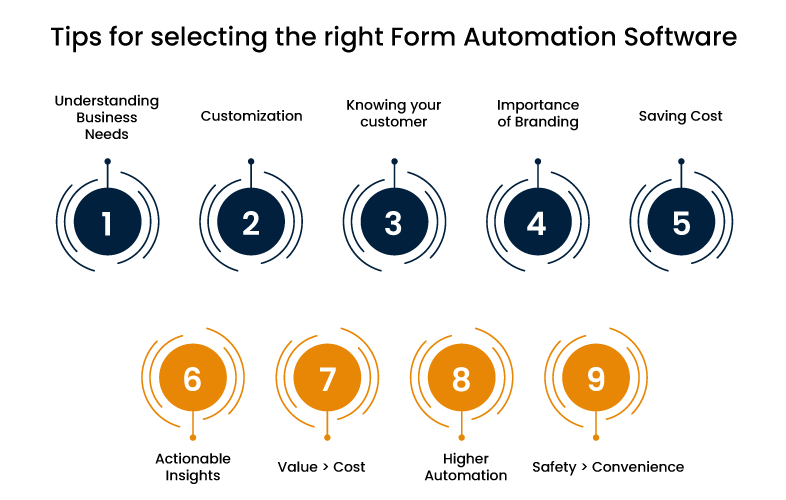
Form automation is the future of tomorrow. A company that can move away from legacy systems to more up-to-date software to adapt to changing business needs and consumer trends is a company that stands to distinguish itself from the noise. Increasing business efficiency and cutting down on redundant human processes contribute to exponential organizational growth, and forms automation sits at the forefront of this digital transformation. Here are some tips for selecting right Form Automation Software !
What is Form Automation?
Form automation allows you to create digital forms that streamline workflows by assigning recurring and mundane tasks to software applications. With digital forms, automation software tool will enable you to increase efficiency, reduce the time taken to complete work, and speed up document processing.
In the U.S. alone, companies spent more than $120 billion on printed forms. Imagine a clothing store trying to track customer experience at the store. Instead of verbally jotting down feedback and concerns, they can simply attach a QR code right next to the billing counter that customers can scan. This feedback will be automatically recorded in the database, cutting down time spent manually responding to concerns.
Knowing the power of form automation is just half the work done; the real work begins with choosing the right form automation software. Making decisions for your business is never easy; multiple factors must be considered.
Tips for Selecting right Form Automation Software

1. Understand your business needs before you begin
What is the objective of integrating form automation software with your business? What are the customer touchpoints that a digital form will be involved in? What are some key workflows that you want to streamline with form automation? It’s critical to start your decision-making by looking into your company, organizational objectives, day-to-day requirements, and future trends. Once the five Ws are answered, it’s easy to shop for the right form automation software.
2. Customization is key to success
Understanding your business needs will help you understand the level of customization required for your organization. While drag and drop templates are plenty, it’s essential to understand the variety of options provided by the software. From radio buttons to drop-down menus, from embedding audio-visual files to open fields, the software should provide plenty of options that can be customized to your requirements.
3. KYCRW- Know your customer, REALLY WELL
Any B2C organization should know their customers better than they know themselves. If your customers are mobile-first, it’s essential to ensure that the form automation software is accessible on mobiles in a glitch-free manner. It’s vital to consider if the software is offered on the web, on a standalone app, or across all platforms and devices.
Also read: Top Forms Automation Tools for you
4. Don’t ignore the value-added of branding in your forms
Every business distinguishes itself through branded elements, including font, colour, and design. Another great tip is to choose a form automation software based on its brand fit to your organization- if it’s customizable in design, templates, and elements, it’s a great fit for your business.
5. Go beyond standard cost metrics
Cost is an essential factor when you’re choosing a form automation software. Instead of comparing packages based just on the price, it’s better to use ROI as a metric to gauge success. What is the monthly cost per user? How many responses are you getting for the money invested in building and maintaining the form? Considering these parameters helps you go the extra mile in making the right choice.

6. Dig deeper when it comes to the insights you can obtain
Instead of looking at information in databases, it’s helpful to uncover the insights you can gain from the information. Take the time to break down the built-in insights that the form automation software provides- the number of forms submitted per day is a very basic insight, but software that tells you which field has the highest drop-off rates becomes a very interesting insight to leverage for efficiency.
7. Place value above the cost
It’s usually good practice to limit the number of fields in a form so that user fatigue is kept at bay, but your organization must be able to take that call instead of leaving it to the judgment of the software. Some software provides a limited number of fields for forms based on the price point of the package you’ve opted for. This can be severely limited, so it’s helpful to compare the value you’re obtaining from a particular automation software with the price you’re paying.
Also read: 5 reasons going paperless reduces paper trail risk for any business
8. Have high standards for the level of automation
The whole point of using form automation software is to speed up your digital transformation. It’s essential to know the level of automation your software provides- it can be as basic as sending an email to the form owner when a new user has submitted the form. It can be as advanced as the form no longer accepting responses once it’s hit the target number. Try to find software that is intuitive and automates beyond expectations.
9. Safety > Convenience
Another great tip that may seem obvious is placing the software’s safety above convenience. The devil’s in the details, and it’s essential to prioritize the level of safety a form has- encryption of data, safe storage on the cloud, security controls, user verification, and customer support are all non-negotiables when it comes to choosing the right form automation software. Ignoring safety protocols because it comes out cheaper or because you don’t think it’s necessary can be a costly mistake much later.
Also Read: Can we use Low-Code No-Code for Form Automation?
Conclusion
While we’ve tried to cover the essential things to remember when choosing the right form automation software, we urge you to research the software’s various features thoroughly. Quixy, for example, is a no-code platform with exhaustive options and great features that will help you build a digital-first company.
For a better understanding, check out our other blogs on form automation software that will help you make a more informed decision!
Frequently Asked Questions(FAQs)
Q. How to choose the right form automation software?
Selecting the right form automation software involves assessing your specific business needs, scalability, ease of use, and compatibility with existing systems. Consider user-friendly interfaces, integration capabilities, and vendor support to make an informed choice that aligns with your objectives.
Q. Which features matter most in form automation software?
The most critical features in form automation software include user-friendly form creation tools, robust data integration, workflow automation, security, and scalability. These features ensure efficient data collection, accuracy, and streamlined processes.
Q. Is form automation software industry-specific?
Form automation software can cater to various industries with customizable templates and configurations. It’s not industry-specific, but adaptability allows it to serve businesses across diverse sectors.
Q. How to evaluate the cost of form automation solutions?
Evaluating the cost of form automation solutions requires assessing both upfront expenses and long-term value. Consider factors like subscription costs, customization fees, and potential ROI from time savings and increased efficiency to make a well-informed financial decision.
Q. Tips for a seamless transition to new form automation software?
Transitioning to new form automation software smoothly requires proper planning and training. Start with a thorough understanding of your current processes, communicate changes effectively to your team, provide training and support, and gradually implement the software to minimize disruption and optimize the benefits of automation.
Login
Please login to comment
0 Comments
Oldest















